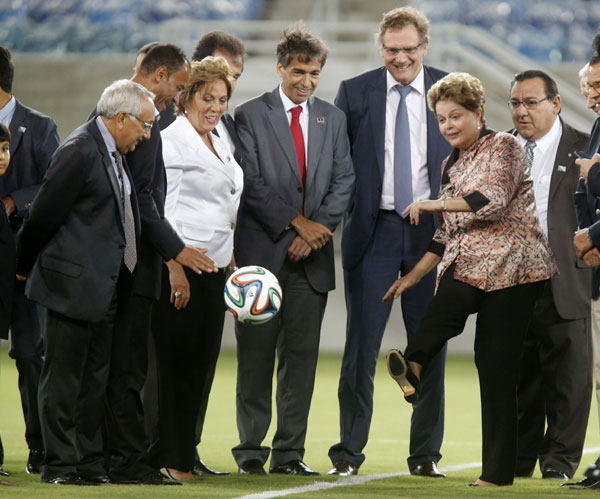

|
 Brazil's President Dilma Rousseff (2nd R) kicks a ball next to FIFA Secretary General Jerome Valcke (3rd R) during the opening ceremony of the Arena das Dunas stadium, which will one of the stadiums hosting the 2014 World Cup soccer matches, in Natal January 22, 2014. Members from FIFA and the 2014 World Cup local organizing committee (LOC) are holding inspection tours to stadiums that will be hosting the 2014 World Cup games.?[Photo/Agencies] |
BRASILIA - Brazilian President Dilma Rousseff gave assurances on Wednesday that the Curitiba stadium, the most delayed of the venues for the World Cup, will be ready on time for the soccer tournament that kicks off June 12.
World soccer body FIFA said on Tuesday that Brazilian officials have until Feb. 18 to prove they can get the Curitiba stadium ready or risk its exclusion from the 32-nation global sports event.
"I believe that everyone, the state governor, the mayor and the contractors responsible for the Curitiba stadium, will finish it on time. I am sure of that," Rousseff said in the northern city of Natal, where she cut the ribbon on the local Arena das Dunas stadium.
It was the seventh of the 12 World Cup venues to be completed and handed over to FIFA.
In Curitiba, the 43,000-seat Arena da Baixada is so behind schedule that FIFA does not know when it might be ready, and the organization's secretary general said he will decide in three weeks whether to drop the city from the tournament.
Jerome Valcke told reporters after visiting the stadium that it was "very, very late" and called it an "emergency situation."
The stadium is only 88.8 percent complete, according to owners Atletico Paranaense. It was supposed to be ready in December, but like five other grounds due to be finished last month it is behind schedule.
The Corinthians Arena, which is due to host the opening match in Sao Paulo, will not be ready until April 15 after a fatal accident set construction back by months. The World Cup's opening game between Brazil and Croatia is scheduled to be held there on June 12.
Work on airports and other public transportation infrastructure is also a huge problem as Brazil prepares to host the tournament for the first time since 1950.
Authorities have admitted that visitors to Fortaleza, where Brazil will play its second match against Mexico, will arrive at an airport terminal built from canvas because the proposed new structure will not be ready in time.







